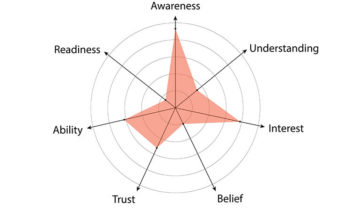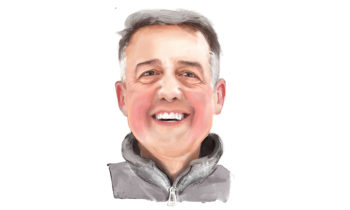Seeking Assistance from Fellow Travelers

We naturally seek assistance from fellow travelers.
Her interviewing happens within the context of a business development setting. She works for a client who has expertise. On behalf of those clients, she aggregates groups of executives who would benefit from that expertise. She moderates a best practices conversation between the executives, positioning her clients as a trusted advisor to the group. In that context, her clients tell stories and share examples of others who have struggled with the challenges being discussed. The consultant’s role is like a bee, cross-pollinating best practices among the executives.
Andi doesn’t trust this conversation to serendipity, however. It is not improv. She does her homework and interviews each executive beforehand, asking questions like:
“What’s top of mind for you?”
“What are your biggest challenges? What gates you from progress?”
And most importantly, “If you could ask a question of one of your peers, what would it be?”
Using their answers, Andi constructs an agenda that cuts through the academic headlines of what an executive should be thinking about, say, “Business model disruption,” and instead gets to the juicy core of what the executives are really thinking about — “Is it better to start a corporate venture fund and seed new business models with an option to buy, or pay up to buy a company once the marketplace has already decided on the winners and losers?”
By asking what an executive would ask of peers, she is really asking, “What keeps you up at night? What scares you.” That’s because,
We rarely need help when we feel capable. It’s when we feel uncertain, we seek assistance.
You may have heard that successful consultative selling starts by asking prospects to describe their “pain points.” Unfortunately, this approach rarely yields results. The problem is that when we ask people to describe their pain points, they rarely give you very much. Instead, they look at you with the kind of slightly pained expression that suggests their minds are being strafed by the nagging feeling that their entire jobs are a “pain point.”
Here’s the theory of pain points articulated by software entrepreneur Mike Suster in Inc. magazine:
Pain is a reminder that unless your prospect has a need to solve a problem, they are not going to buy a product. Customers sometimes buy things spontaneously without thinking through what they actually need. But, often, there is an underlying reason for a purchase, even if the buyer doesn’t bring it to the surface.
The problem is not the theory. The theory makes sense.
Better, though, is Andi’s approach of asking would-be clients, “What would you want to talk about with a peer if you had the chance?”
That’s because we naturally seek assistance from those who are fellow travelers.
Fellow travelers are people who have the same responsibilities and reporting relationships in similarly-sized companies. Their advice is the gold standard. They have walked in our shoes. They know the complexity and politics we face. They understand the world of constrained resources. These are not ivory tower, never-run-a-thing experts. They are us, only with more experience.
That is why in front of peers, over drinks at the conference, that we confide and tell the truth. It’s only with peers that we talk about our strengths and talk about where we need help.
And that is Andi’s secret. It is what makes her a higher-level interviewer. She isn’t just asking a series of compelling and artfully-worded questions. She is actively harnessing the power of peer trust and using it like a can opener to get at the good stuff — the gray, squishy, I’m-not-really-sure place that sales executives call “pain points” but executives call “need.”




